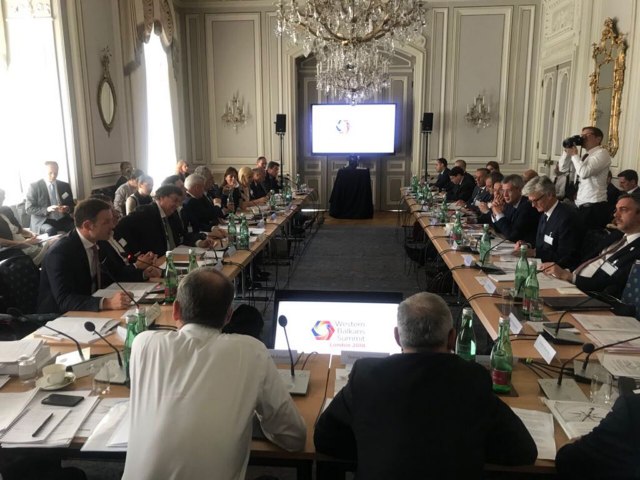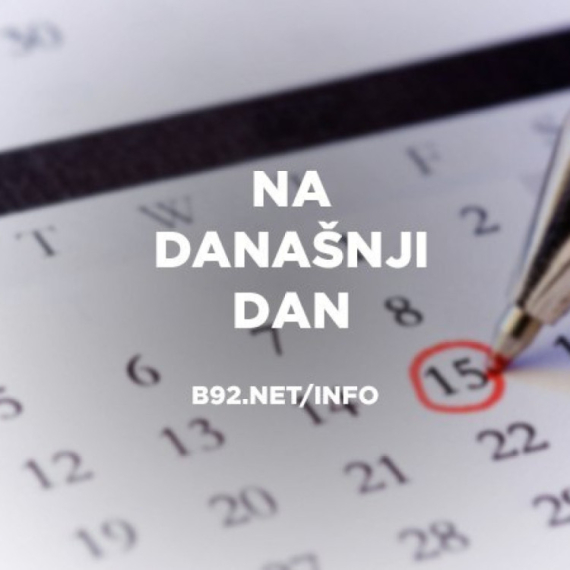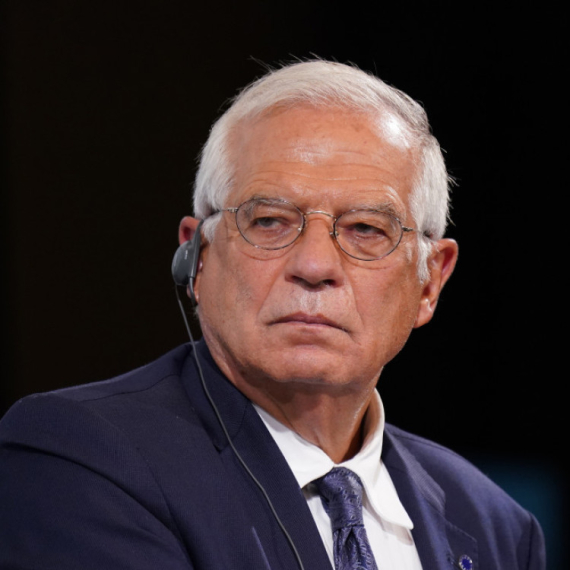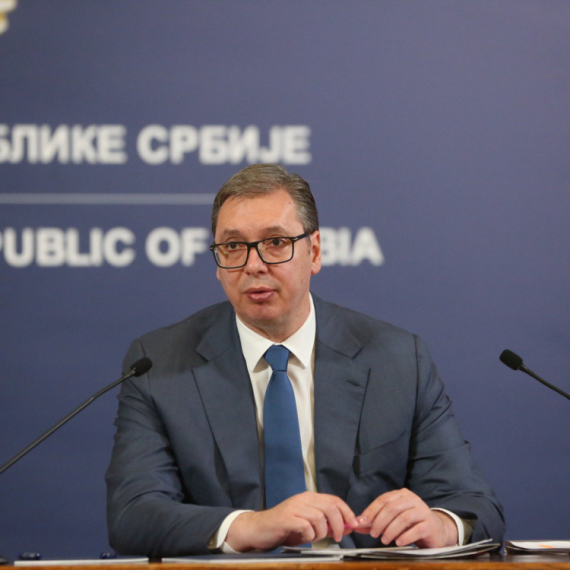Berlin Process 2014-2018: Gains and challenges
Thursday, 05.07.2018.
11:33

Berlin Process 2014-2018: Gains and challenges
The veteran Austrian politician made that comment in Tirana in an interview with Albanian Daily News a few weeks before the 2018 London Summit which is the fifth annual event in the frame of the Berlin Process initiative for European integration of the Western Balkans states.It is officially reported that the Summit will take place on July 9-10 being preceded by summits which took place in Berlin in 2014, considered as the launching event of the process, Vienna in 2015, Paris in 2016 and Trieste in 2017. Heads of government, foreign ministers and ministers of economy of Albania, Bosnia and Herzegovina, Kosovo, Republic of Macedonia, Montenegro, Serbia, as well as EU member states from the region Croatia, Slovenia and EU member states Austria, France, Germany, Italy as well as representatives of the European Union and the International Financial Institutions are to attend.
The UK has invited EU partners including Austria, Croatia, France, Germany, Italy and Slovenia. Bulgaria has been invited in light of the EU28 Western Balkans Summit in Sofia in May 2018 and Poland has been invited as they will host the Western Balkans Summit in 2019.
"The Prime Minister will host the Western Balkans Summit in London, demonstrating our longstanding commitment to the region and to European security," an official statement issued recently by London said, which aims apparently to reduce suspicions that UK's interest in the Western Balkans will diminish after its exit from the EU. "The UK wants a strong, stable and prosperous Western Balkans region. By hosting the summit in London, we demonstrate our continued interest and involvement in the stability of the region beyond our exit from the EU," said the statement.
The proposed agenda of the Summit anticipates that the focus will be on three important aims: Increasing economic stability with a view to improving the business environment, encouraging entrepreneurship, addressing youth unemployment, and promoting regional inter-connectivity; strengthening regional security co-operation to help tackle common threats, including corruption, serious and organized crime, trafficking of people, drugs and firearms, terrorism and violent extremism; and facilitating political co-operation - to help the region resolve bilateral disputes and overcome legacy issues stemming from the conflicts of the 1990s and strengthen democracy and gender equality.
Building on achievements...
It should be highlighted that the Berlin Process should be seen as giving a hand to the region to reform and help with the EU accession process and now on a sober analysis of what was achieved and how to build on it should be made. When it is considered whether promises and commitments have been fulfilled, it should be started from the very beginning because the initiative was launched without any big promises as it was the case with the Stability Pact back in 1999. Facts show that since the beginning of the Berlin Process, very few projects have been able to spring up concretely, and it is noteworthy that this will probably remain the case for several years.
That means that the connectivity agenda, to date, has fallen short of both producing highly visible outputs and achieving major progress in broader. Faced with the initial expectations it aroused, the Process has not delivered the anticipated results. But analysts highlight that a very high quality bilateral relationship, in the first place in economic sense, has been established between Albania and Serbia.
But Mr. Gjergj Buxhuku, General Administrator of Albkonfindustria answering a question put by Albanian Daily News said that the balance-sheet of the Berlin launched initiative for strategic investments in the Western Balkans, which will be presented in the July's London Summit, is not positive.
"With the exception of some sectorial forums and presentation of certain draft ideas by some different Balkan countries, things have not moved forward in the practical aspect," he said, adding that there are two main reasons having been the cause of the 'thin' accomplishments: firstly, some geostrategic developments in the EU and on world scale, and secondly, the failure to prepare properly such initiatives.
"It should be added the financial impotence for investments by the EU due to the economic crisis leaving Germany alone. The exit of the UK from the EU is a clear sign of the above," said Mr. Buxhuku.
For his part, Mr. Veran Matic, Chief Executive Officer and Editor-in-Chief of Belgrade's leading independent Radio and Television station B92, notes that that the main idea of the initiative was for the states of South East Europe to prepare for becoming members of EU, and knowing (especially Germany) that this would be rather long period, the project was established having as aim to fill this period with projects useful for the countries from SEE region, but also for Germany.
Answering a question put by Albanian Daily News, Mr. Matic said the plan was to gather all the leaders from SEE region on one attractive venue, with the authority, and to see whether it would be possible to connect those states, whether it is possible to establish closer and more intensive cooperation, and since that initial meeting went well, other ideas were presented, regarding the infrastructure and general economic cooperation.
"We have to admit that through those initiatives, very high quality bilateral relationship, in the first place in economic sense, was established between Serbia and Albania. When it comes to Serbia, there were initiatives on similar projects with Croatia, which was not interested at start for the cooperation within Berlin Process, so not a single joint project was implemented although it is necessary, i.e. to modernize the railroad Belgrade- Zagreb," said M. Matic.
Expectations from London Summit...
To speak of the results of the London Summit much will depend on what will happen at the EU summit ten days earlier of the even in London. Asked by Albanian Daily News the Bulgarian political analyst, Angel Petrov, who writes for Dnevnik, was of the opinion that if even one of the Western Balkan countries, be it Albania, Macedonia, or both, gets a political encouragement, that is the opening of the EU accession negotiations, then, it will be a strong message to the entire region. "This could allow for the countries to feel an incentive to pursue the Berlin process agenda, instead of seeing it as an alternative to a proper political commitment on behalf of Europe," he said.
"On the one hand Britain is not giving the best of examples to the Western Balkans by leaving itself. On the other, the fact it works to "Europeanize" the region by promoting economic stability, infrastructure and connectivity beyond the EU framework is commendable. The problem is that, at a time of high political expectations fueled by the Bulgarian EU Presidency and by the successor Austria, a fifth repeat of the same kind of pledges (albeit with alterations, and even if these result in concrete projects), will feel like more of the Mr. Marciacq, Deputy Secretary General of the Austro-French Centre for Rapprochement in Europe, same," said Mr. Petrov.
In the meantime Mr. Florent Marciacq, Deputy Secretary General of the Austro-French Centre for Rapprochement in Europe wrote in European Western Balkans portal on June 1, 2018 that the Berlin Process will definitely continue, although the format is yet unknown. However, he explains that one of the weaknesses of the process is that it does not have a built-in steering and monitoring mechanism.
"The Member States organizing the yearly Berlin Process Summits are responsible for following up on the initiatives launched by their predecessors. No specific institution is tasked with having oversight over the strategic development of the overall process or monitoring its achievements," he said.
"Whether new participating states will be invited to join the initiative and how the process will unfold, however, is not settled yet, for lack of steering mechanism," Mr. Marciacq said.
However, the British Ambassador to Albania, Duncan Norman was hopeful that the London Summit will show his country's determination to continue its commitment in the Western Balkans. "In July the UK hosts the WB Summit a demonstration of our continuing commitment to the Balkans which will see the Prime Ministers of all six WB countries meet in London," the Ambassador said in Tirana a few days ago in his speech celebrating Her Majesty the Queen's 92nd birthday, in this, the 66th year, of her reign.
But Serb Political Analyst Veran Matic thinks that when it was seen how last meeting in Trieste was organized, without serious energy and vision, from all sides involved, he does not expect much from London or Warsaw.
"Nothing sensational, as there are no sensational and quick solutions, but only those well-thought, long term ones, that take great efforts that should be carefully coordinated within the region and towards Europe," noted Mr. Matic.
Much depends on the region
However, when former Vice-Chancellor of Austria Erhard Busek notes that now some things are progressing, he hastens to draw the attention that "it depends much on the region for the things to move forward". As a matter of fact such an idea has been backed by many analysts according to whom the Balkan countries are used to waiting for someone else to provide for them rather than be themselves proactive by regularly giving new ideas, initiatives, projects, that would be beneficial to the region in the whole, but also outside of it.
"Instead of building our relations steadily and in the long run, we often used to be destructive, doing quite the opposite without any reason, spoiling our relations especially on a daily political level, and then it is reflected in the economy, culture, etc. We have witnessed this very often for the last three decades," Mr. Matic said. "The thing is that SEE region should not wait for others to organize something and to deliver it, instead of that, we should launch initiatives, and through Berlin Process, we should say what we need and what are our priorities, and what are we going to do on our own. I know that this is something no one wants to hear in our region, as we trust supernatural powers and solutions over night."
What does Mr. Matic suggest when asked by Albanian Daily News on what can the regional countries do to keep the Berlin Process alive. " Maybe it is possible to make stronger breakthrough due to some other goals and policies, but I believe that we need to do more in this process, to contribute to more intensive and regular communication, creating permanent bodies for economic cooperation in the region, regular bodies for discussing normalization, cultural cooperation, etc."
For his part the Albkonfindustria head Buxhuku thinks that the governments of the Western Balkan countries try to use their internal economic and political problems as means of pressure towards the rich EU countries and mainly against Germany for obtaining easy money, rather than joining forces to move forward on their own. "Naturally, this is a fruitless scheme in the conditions of world developments where EU is weak and not interested for the enlargement with poor countries, which have also problems regarding democracy like those of the Western Balkans," he said.
The only body that was established dealt with youth cooperation, but we haven't gone far in that field as well, as it is not possible to agree on certain positions for almost a year.
The creation of the Regional Youth Cooperation Office (RYCO), Connectivity Agenda and launch of the Western Balkan Chambers Investment Forum, have been noted as successful areas of this initiative. However, those too face some challenges - Western Balkan countries have promised more than they can or intend to deliver.
Tirana-based RYCO has been marked as an example of success within the Berlin Process, but it is stated that its success will ultimately depend on its capacity to foster intra-regional mobility across ethnic lines and on the number of youth ready to participate in its programs.
When it comes to the overall accomplishment of the process, it should be also noted one important aspect: the boosted interest of WB6 and EU stakeholders for regional cooperation and the multiplication of regional meetings at all levels, which in turn constitute an effective way of building trust and interpersonal relations.
The question which has been common during the last months has been what will happen after this cycle ends, if it will remain and under what format it could function. Likewise other questions have dealt with the key issues how much the process has delivered and is it worth continuing, or its mission is over as predicted when it stated.
"A flaw of the process pointed out by analysts is the lack of a follow-up mechanism. But so long as there are no goals set for the Western Balkans other than agree to initiatives (and such a goal is beyond the process's competences) and show up at summits every year, it will remain a vague process, whatever good ideas might be brought up there and whatever changes to the format are introduced for the sake of efficiency," said Bulgarian analyst Petrov.
"So this process, a positive idea in itself, and another chance for dialogue, is not self-sustainable unless combined with this "perspective" or signs of it (a prerogative of the other process, the EU process) that have been on the agenda since January. Otherwise, Europe's "enlargement fatigue" will very soon, and why not in the time around this summit, be awkwardly combined with the Western Balkans' dialogue fatigue."
On the question what comes next after the Berlin Process, Deputy Secretary General of the Austro-French Centre for Rapprochement in Europe Marciacq points out there might be several options to consider.
"At best, the Berlin Process would operate in parallel to the EU's 'business as usual' approach; at worst, in joining the plethora of regional initiatives already in place in the region, the Berlin Process would lose its specificity and be diluted in the EU's 'business as usual' mainstream," he clarifies, adding that there is a certain temptation in proceeding that way.
Reflecting on the previously mentioned London Summit, he explains that it rather sends a confusing message to the Western Balkans. "It seems that in entrusting the UK to host the Summit in 2018, the Berlin Process responds to outdated commitments, rather than adapting to new realities in a reflected, consistent, and forward-looking manner." However, Marciacq states that the Berlin Process may not end up as an initiative that proved disappointing in relation to the expectations it aroused.



















































Komentari 0